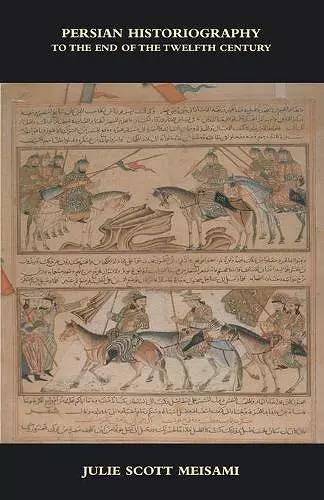Persian Historiography
Format:Paperback
Publisher:Edinburgh University Press
Published:6th Jul '99
Currently unavailable, and unfortunately no date known when it will be back

Winner of the 1999 British-Kuwait Friendship Society Prize in Middle Eastern Studies. Described by the BKFS reviewer as "A ground-breaking work on a subject that has been almost totally neglected." "Why write history in Persian?" Persian historical writing has received little attention as compared with Arabic, especially as seen in the early (pre-Mongol) period. Within the larger context of the development of Islamic historiography from the tenth through the twelfth centuries, the case of Persian historical writing demands special attention. Discussions tend to concentrate on its sources in pre-Islamic Persian and in Arabic works, while the reasons for its emergence, its connections with Iranian and Arabic models, its political and cultural functions, and its reception, have been virtually ignored. This study answers these questions and addresses issues relating to the motivation for writing the works in question; its purpose; the role of the author, patrons and audiences; the choice of language and the reasons for that choice; the place of historical writing in the broader debate over the suitability of Persian for scholarly writing.
This is a highly praiseworthy undertaking that presents the first monograph ever exclusively dedicated to a comparative study of a wide range of Persian historical writing. Meisami is out to set the record straight, and the result is the most original and scholarly contribution to our knowledge of the formative years of this rich and vibrant field of Persian literature. [Meisami is] particularly well equipped to approach Persian historical sources from a fresh angle; one that is less concerned with the reliable information' they might contain, more with why and how they were written! she has opened up many lines of inquiry, and her book comes at the right moment to influence a slowly growing body of scholarship that is seeking to understand what Persian historians regarded as meaningful and why they saw some 'events' as memorable rather than others. Until now there has never been a substantial, detailed attempt to give a comprehensive appraisal of this literature as a whole. .. In this ground-breaking work, Julie Meisami attempts to set the record straight and put 'Persian historical writing back on the map of Islamic historiography. This is a highly praiseworthy undertaking that presents the first monograph ever exclusively dedicated to a comparative study of a wide range of Persian historical writing. Meisami is out to set the record straight, and the result is the most original and scholarly contribution to our knowledge of the formative years of this rich and vibrant field of Persian literature. [Meisami is] particularly well equipped to approach Persian historical sources from a fresh angle; one that is less concerned with the reliable information' they might contain, more with why and how they were written! she has opened up many lines of inquiry, and her book comes at the right moment to influence a slowly growing body of scholarship that is seeking to understand what Persian historians regarded as meaningful and why they saw some 'events' as memorable rather than others. Until now there has never been a substantial, detailed attempt to give a comprehensive appraisal of this literature as a whole. .. In this ground-breaking work, Julie Meisami attempts to set the record straight and put 'Persian historical writing back on the map of Islamic historiography.
ISBN: 9780748612765
Dimensions: unknown
Weight: 706g
336 pages